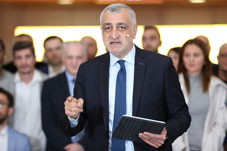
Leader of Lelo on LGBT rights and Forest Code
By Nika Gamtsemlidze
Monday, June 8
According to Mamuka Khazaradze, the leader of the party Lelo for Georgia, the rights of the LGBT community in Georgia are ‘very well protected,’ as he said, minorities should not violate the rights of the majority. He spoke about this topic on TV Pirveli.
“I think this is very well defined in the constitution and I don't think it needs to be revised. We don't have to show any innovation in this direction. The rights of minorities in our country are very well protected. There might be some cases where the law is not used, but this does not mean that the minorities should violate the rights of the majority,” said Khazaradze.
Asked by a journalist what he thinks of granting LGBT community the right to marry and adopt, the politician said he believes that a child should be raised by a mother and father. “We have to act according to the law. It is well written in the constitution and we have to follow it. I don't think it needs more publicity. I am against marriage and adoption here. I think a child should be raised by mother and father,” stressed Khazaradze.
Also, according to Khazaradze, gifting of forests to the churches and monasteries of the Patriarchate is not a problem. He is sure that the church will take good care of it.
The Parliament of Georgia has approved the Forest Code, which stipulates that the forest area adjacent to all churches and monasteries in Georgia may be transferred to the ownership of the Patriarchate, not more than 20 hectares each.
This record of the Forest Code has been criticised by NGOs, who have issued a number of statements. They oppose making changes in this way. According to the Institute for Tolerance and Diversity (TDI), the initiative gives additional property and financial privileges to the dominant religious organization, as well as violates the constitutional principle of the separation of state and religion.
TDI notes that the scale of state-owned property and funding provided to the patriarchate is increasing in the run-up to the election. According to them, this can be explained by the government’s desire for political support from theinfluential institution.
According to another NGO, the Center for Human Rights Education and Monitoring (EMC), the changes run counter to fundamental constitutional principles, and they say it creates an unfair practice of managing and allocating strategic natural resources.
The EMC also suggests that this initiative to transfer additional privileges to the Orthodox Church is likely to be of interest to the government in gaining loyalty of the Patriarchate in the pre-election context.


